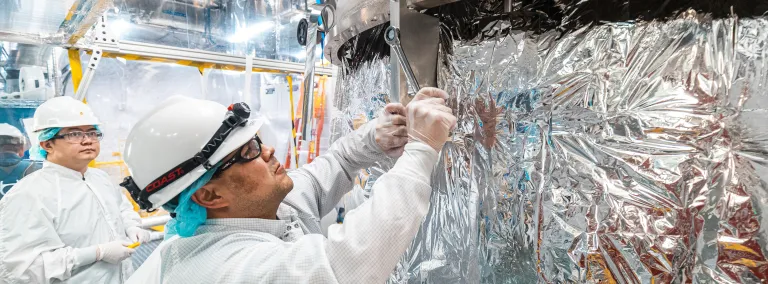SURF Plans Long-Term Future with Call to Global Scientific Community
SURF is seeking input from the global underground science community in a new outreach effort to ensure scientific priorities are being met and SURF is achieving its mission.
Sanford Underground Research Facility (SURF) is seeking input from the global underground science community in a new outreach effort to ensure scientific priorities are being met and SURF is achieving its mission to advance world-class science and inspire learning across generations.
SURF has issued a request for letters of interest from collaborations and researchers around the world who want to establish or affirm a connection for future work at the facility. The last time SURF solicited input in this format was 2008, which heavily leveraged an earlier 2005 call, and set the foundation for world-leading underground science experiments occurring at the facility today.
“We’re seeing growing interest from the underground science community and real excitement about the future possibilities for research at SURF,” said Jaret Heise, director of science at SURF. “Requiring just a short description of high-level elements at this stage, we are casting a wide net to gauge interest from a diverse range of possible experiments that can take advantage of SURF’s unique attributes.” The initial letter can open the door for further discussions and planning for future experiments at SURF.
Heise says the process not only informs scientists around the world about the opportunities for underground research at SURF, but it also helps inform SURF about the needs of the underground science research community. “This communication with the research community helps us learn about the needs of researchers working on next-generation dark matter and neutrino experiments. Furthermore, this helps us identify any shortfalls we may need to address to best accommodate this future research,” Heise said.
Since opening as a dedicated laboratory for science in 2007, SURF has a long track record of attracting world-class research. To sustain that achievement, the facility must remain competitive with underground labs in other parts of the world, notably in Europe and Asia, as well as in Canada.
History shows that landing this world-class science requires forward thinking decades into the future. The scientists who backed the creation of an underground lab in Lead following the closure of the former gold mine in 2001, already had a vision for transformational experiments like the Deep Underground Neutrino Experiment (DUNE) now under construction at SURF.
“We need to play the long game,” Heise said. “Planning for the scale of laboratories needed for the next generation of physics experiments can take a decade or more to realize. Adding new laboratory caverns has been part of SURF’s strategic plan since 2020, and that vision convinced state legislators to make a generous investment to jumpstart a new SURF expansion.”
Heise says while physics experiments like DUNE take up a large part of SURF infrastructure, the facility also has a strong history of research in other disciplines like engineering, biology, geology, and geothermal energy. He adds there is a great future for multidisciplinary research and intellectual community building through The Institute for Underground Science at SURF.
Heise also points out that this process extends previous efforts to seek input from the underground scientific community, like the Long-Term Vision Workshop, held in 2021, and the process that informed recent strategic planning efforts in nuclear science (Long Range Plan to the Nuclear Science Advisory Committee), and high energy physics (report by the Particle Physics Project Prioritization Panel [P5]).
“The most recent P5 report reinforces the vital role that SURF plays in the advancement of physics in the United States and around the world. This outreach effort helps SURF plan for future expansion that will keep the facility home to world-leading experiments for decades to come,” said Mike Headley executive director of the South Dakota Science and Technology Authority and SURF laboratory director.
SURF’s Science Program Advisory Committee (SPAC) will review proposals from researchers and institutions around the world and make recommendations on what experiments are the best fit for the facility.
